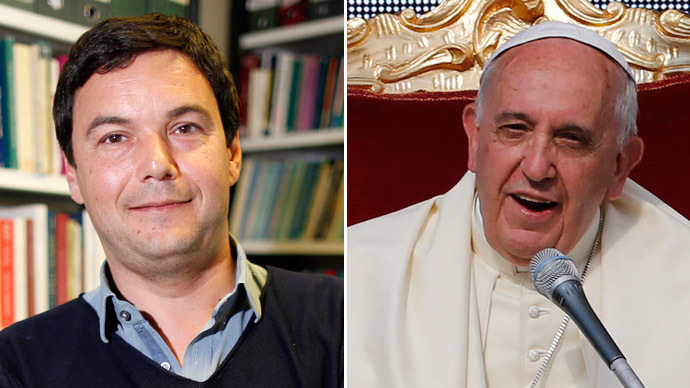Piketty and the Pope, and why Marx is back

The criticism of income inequality that Thomas Piketty exposes in his bestselling “Capital in the 21st Century” is not very different from Pope Francis’s views on capitalism in his apostolic exhortation “Evangelii Gaudium” last year.
The Financial Times is trying to demonstrate that the French economist’s theory is wrong, and Rush Limbaugh, among other conservatives, has accused both men of Marxism, which for him is synonymous with being wrong, of course. But being labeled a Marxist is not offensive anymore; it’s simply a sign that Marx has returned from the remnants of communism to invite academics, activists, and even clerics to seek in his thought solutions to the ongoing global recession.
Even though Piketty and the Pope (formerly Cardinal Jorge Mario Bergolio) have denied any interest or faith in Marxism, they will not be forgiven anytime soon because anyone who points out capitalism’s social flaws pulls a fire alarm in our state of exception.
The good aspect of this alarm is that it indirectly gathers together people concerned with such vital matters as the distribution of wealth, health and education, as demonstrated by UNASUR and the Occupy Movement.
The Pope has called for redistribution, and Piketty has suggested a way that this can be implemented through a progressive global tax on capital or wealth. And has also (indirectly) become the papal economist. In order to explain why the French economist’s solution is appropriate for the pope’s concerns, let’s quickly recall both theses.
The most interesting feature of “Evangelii Gaudium” is not that the Pope calls for a more equitable distribution of wealth but rather that he makes this call in the spirit of Gustavo Gutiérrez’s liberation theology.
According to Pope Francis, a “financial reform” is necessary not only “because the socioeconomic system is unjust at its root” but also because “today’s economic mechanisms promote inordinate consumption.” When this unbridled consumerism is combined with inequality it proves particularly damaging to our society, where the “excluded are not the ‘exploited’ [anymore] but the outcast, the leftovers.”
As we can see, the Pope is opposing not just an economic system where exclusion is possible but one where it has become the norm, that is, the “result of ideologies which defend the absolute autonomy of the marketplace and financial speculation.” As a true postmodern philosopher, Pope Francis concludes his observations by pointing out how far “we are far from the so-called ‘end of history’” because economic growth, encouraged by a free market, instead of bringing greater prosperity for all, has increased “widespread corruption and self-serving tax evasion, which have taken on worldwide dimensions.”
Piketty seems to have provided both historical and economic justification for the Pope’s concerns over an “economy of exclusion” and a “financial system which rules rather than serves.” If capitalism has become such an economic system it is not simply because of its natural drift toward high inequality, which the author demonstrates through detailed historical analysis, but also because capitalism permits the concentration of wealth to perpetuate from one generation to the next (as the Spanish royal family has just demonstrated).
This occurs when the “rate of return on capital exceeds the rate of growth of output and income” and “capitalism automatically generates arbitrary and unsustainable inequalities that radically undermine the meritocratic values on which democratic societies are based.” The French economist suggests a “progressive annual tax on capital” that would contain the “unlimited growth of the global inequality of wealth, which is currently increasing at a rate that cannot be sustained in the long run and that ought to worry even the most fervent champions of self-regulated market.”
If Piketty seems to have become Francis’s economist, it is not simply because he provides a solution the Pope would most likely endorse, but also because he has moved away from the scientific nature of his discipline, that is, economic determinism. After all, the French economist believes that the “resurgence of inequality after 1980” was not caused simply by capitalism’s inevitable drift towards inequality but also by “the political shifts of the past several decades, especially in regard to taxation and finance.” The Pope’s call for a financial system that “serves instead of rules” is directed against this political shift, which has always avoided financial reforms such as those suggested by both men.
Although Piketty will probably continue to teach economics in France instead of moving into the Vatican, the Pope now has an economist whom he can rely upon when he pontificates from Rome, regardless of all accusations of Marxism. These accusations, then, are not only necessary to bring together economists and the Holy See but also serve to mark a turning away from capitalism’s acceleration of inequality for anyone so accused, regardless of our faith or social status.
Santiago Zabala for RT
Santiago Zabala is ICREA Research Professor of Philosophy at the University of Barcelona. He is the author of, among other, The Hermeneutic Nature of Analytic Philosophy (2008), The Remains of Being (2009), and, most recently, Hermeneutic Communism (2011, coauthored with G. Vattimo), all published by Columbia University Press and translated into several languages. His forthcoming book is Only Art Can Save Us. He also writes opinion articles for The New York Times, Al-Jazeera, The Los Angeles Review of Books, and The Guardian.
The statements, views and opinions expressed in this column are solely those of the author and do not necessarily represent those of RT.
The statements, views and opinions expressed in this column are solely those of the author and do not necessarily represent those of RT.













